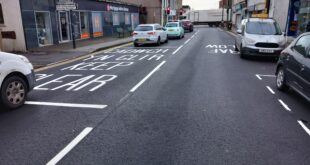Millions of people across England will be able to travel by bus for £2 from under a temporary scheme intended to help with the cost of living.
From 1 January to 31 March, more than 130 bus operators such as National Express and Stagecoach will cap the price of single tickets at £2.
At present, an average single local bus ticket costs £2.80 – while in some rural areas, a single ticket can cost over £5.
More on Buses
Buses minister, Richard Holden, said: “Brits love buses. They’re the most popular form of public transport in England, making up half of all journeys. So we’re investing £60m to cap single bus fares at £2 to help families, students and commuters and help get people back on the bus.
“The scheme will also take two million car journeys off the road and it’s fantastic to see so many bus operators signing up. So, if you’re in Carlisle or Weston-Super-Mare, Birmingham or Doncaster, make sure you hop on the bus and ‘get around for £2’ between 1 January and 31 March.”
Bus fares vary widely across different parts of the country and between bus operators.
It is hoped the bus fare cap will also help the bus industry continue its recovery from the pandemic by encouraging greater bus use – after a rough year that has seen several operators withdraw from markets or collapse.
More on Cost of Living Crisis
Tom Stables, CEO of National Express, said: “More people using buses is good for the economy, environment and wider society.
“We know that great value, low fares encourage people to switch to the bus so are proud to join this scheme. And even better, we’re also freezing child fares at £1. Bus travel is simple, cheap and easy and there’s never been a better time to get onboard.”
Graham Vidler of the Confederation of Passenger Transport said: “We look forward to welcoming more customers on board when the £2 fare cap in England starts in January, as it complements great value fares already in place that make taking the bus more attractive and environmentally friendly this winter.
“Travelling for £2 on the bus both helps customers facing rising cost challenges and try a new travel option to get to work, education, public services, leisure or see loved ones.”
Source link



